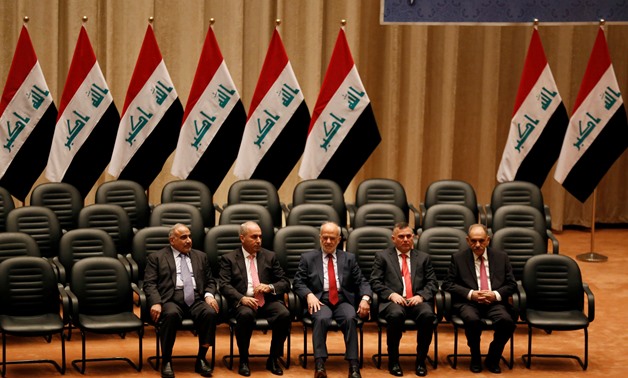
L to R) Iraq's new ministers, Oil minister Adel Abdel Mehdi, Planning minister Salman Ali Al Jumaily, Foreign minister Ibrahim Jafaari and Iraq's new deputy prime ministers Baha Araji and Saleh Mutlaq sit during a parliamentary session to vote on Iraq's n
BAGHDAD/KIRKUK, Sept 14 2017: Iraq's parliament on Thursday voted to remove the governor of Kirkuk, a staunch supporter of Kurdish independence, following a request from Prime Minister Haider al-Abadi just days before a referendum on whether to split from Baghdad.
Governor Najmaddin Kareem said he was not going anywhere and Kurdish leaders vowed to carry on with the vote planned for Sept. 25.
Iraqi lawmakers authorised Abadi this week to "take all measures" to preserve national unity before the independence referendum.
Baghdad and Iraq's neighbours are opposed to the vote. Iraqi lawmakers say it will consolidate Kurdish control over several disputed areas, including oil-rich Kirkuk.
The province is claimed by both the central government in Baghdad and the semi-autonomous Kurdish region in northern Iraq.
Kurdish leaders immediately rejected Baghdad's move on Thursday, insisting the parliament had no right to vote out the elected Kareem. Kareem himself vowed to ignore parliament and press on with the plebiscite.
"I will stay in office," he told Reuters. "The referendum will go on as planned."
"The prime minister does not have the power to ask parliament to remove me," he said.
Kareem is a vocal supporter of the referendum and advocated for the vote to be held in Kirkuk.
Kurds have long claimed Kirkuk and its huge oil reserves. They regard the city, just outside their Kurdistan region in northern Iraq, as their historical capital. But the ethnically mixed city also has Arab and Turkmen populations.
The referendum has become a potential flashpoint in the region, with Western powers worrying it could ignite conflict with the central government in Baghdad and divert attention from the war against Islamic State militants.
Turkey has the region's largest Kurdish population and fears a "Yes" vote could fuel separatism in its southeast where Kurdish militants have waged an insurgency for three decades in which more than 40,000 people have been killed.
Iran and Syria also oppose the vote, fearing it could fan separatism among their own Kurdish populations.
"PUBLIC BACKLASH"
Kareem has long riled the federal government with his aspirations for Kurdish independence. Last spring, Kirkuk's governorate voted to raise the Kurdish flag over state buildings, despite Baghdad's insistence that only Iraq's national flag should fly in the multi-ethnic city.
"He is an elected governor of the council of Kirkuk," said Hoshyar Zebari, a close adviser to Kurdish President Massoud Barzani. "That is the only body that can remove him."
Kareem has previously stated that only a vote by Kirkuk's governing local council could remove him.
"The escalating tactics this week by the Iraqis are causing a large public backlash, and will strengthen the Kurdish referendum enormously," Zebari said. "This basically mean that the current leaders of Iraq don’t want us to be their partners."
Barzani has vowed to press ahead with the referendum and that the vote will be held on time, despite U.S. requests for it to be postponed.
Zebari said on Thursday that the vote would still be held in Kirkuk.
Kurdish MPs in Iraq's parliament boycotted Thursday's vote, which was attended by 173 lawmakers in Baghdad. A majority voted to remove the governor, lawmaker Husham al-Suhail told Reuters.
Asked whether parliament had the right to dismiss Kareem, Suhail referred to an article in Iraq's constitution which parliament used as the legal basis for the vote.
The article states that a governor of one Iraq's 19 provinces can be dismissed for one of four reasons, including whether public funds have been wasted or negligence.
Suhail gave no details about what Kareem accused of.
"I don't even know what the accusations are against me," Kareem told Reuters.
"This is unlawful ... I have the support of the government council, I have the support of the people, we are here and we will continue," he said.
"The president of the Kurdistan region has made it clear that the referendum will be held," including in the disputed territories.


Comments
Leave a Comment